Share the page
Workshop: Overcoming institutional and organisational barriers to sanitation

-
When
-
-
Schedule
-
8h30 – 19h30
-
Where
-
AFD, Le Mistral, Paris
Sanitation remains a great challenge of our time, especially in fast-growing cities of Africa and Asia. AFD invites you to the scientific workshop organized by the ParisTech Chair “SUEZ-General management of urban water and sanitation services” on March, 31st.
